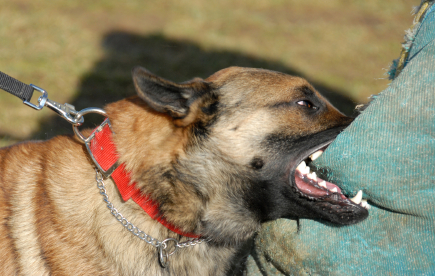
Have you already figured out where I’m heading based only on this title? If not, I can reveal this is not an advertisement for corn or a good street vendor that serves it. If your police dog is biting suspects like a kid eats corn on the cob, you may get in trouble. You may have also heard a few other terms describing a police dog that fails to get and hold a full-mouth bite; typewriter, playing the piano. These are not good terms and very often this bad practice is ignored by a handler, overlooked by a supervisor and/or overwhelming to overcome for a trainer.
Honestly, the term “full-mouth bite” for a police dog used to make me cringe when I heard it from the perspective of explaining it to a jury and to those not familiar with the term. It sounds bad, right? If you think “bite is a bad word” (and it is not), what does “full-mouth bite” cause you to picture? Sharks in a feeding frenzy? Piranhas working on a cow that wandered into the river? Full-mouth bite is not a bad term and it should be a part of your regular training and your training vocabulary. However, I don’t believe it is a term to be used for report writing – just use “bite.”
A full-mouth bite is the ideal and proper way a police dog should be trained to bite and hold a suspect. One bite. No nips. No nibbles. Not multiple bites. I’m not going to describe how to teach it or train it – you can ask trainers and research on your own if you don’t know – but I will share this; If your dog is biting a suspect multiple times without good and articulable reasons, and the injuries are significant, you may find yourself having to explain the circumstances from an excessive force perspective.
A police dog that applies a good full-mouth bite is considered a reasonable use of force. A police dog that bites multiple times without justification may be considered an excessive use of force.
I’m not referencing this topic to a suspect who physically resists the bite of the dog beyond a normal defensive action and attempts to disengage from a bite or bites that occurs as a result of a strong physical defense before another bite occurs or is commanded. And, I’m not referencing this topic to a dog that releases an initial bite because it is in an awkward position to continue biting and seeks a better spot to bite and hold – one time. Yes, there are probably a few other circumstances – but I hope you get the point.
Multiple bites usually cause multiple injuries. It’s been proven in most cases and advocated that a single full-mouth bite will result in less serious injuries when properly applied. Multiple injuries usually require more medical attention and more medical attention usually means a bigger hospital bill. Multiple injuries can also be viewed and documented as evidence of excessive force and poor training.

Here’s my take on this situation; If you have a police dog consistently incapable of a full-mouth bite in real-world applications and training, and this dog routinely releases and bites multiple times without strong suspect intervention or reasonable justification, the dog should be removed from the street, attend remedial training with the proper equipment to learn how to bite properly with and without physical resistance from a decoy, and the dog should be dismissed (“fired”) from further service if it is still incapable of applying a proper bite and hold. You can’t afford the risk of continuing to deploy this dog.
This could also be titled “Failure to apply a full-mouth bite” as a reason you might get in trouble. I’m hoping the title and its content might get your attention and hold it a little longer if it applies to your dog and you – as the handler, supervisor and trainer.
Take care, be safe and make every day a training day…
Bill Lewis II
This “reason” was originally shared on March 2, 2016.

“Trouble” isn’t always related to incidents or predicaments that directly result in lawsuits, claims or discipline. Often times, our actions or inactions that are missed, deliberately overlooked or downplayed may lead to nothing or can later lead to mistakes or bad incidents with minimal to serious repercussions. A reason we get in trouble can be minor or simple at first glance – or even serious – but a combination of these factors can often have disastrous consequences.
These “reasons” are provided periodically as a collection in-progress based on actual incidents and real attitudes as well as feedback received at HITS, the CNCA Training Institute, and the “Canine Liability 360” classes. As Gordon Graham says, “We haven’t found new ways to get in trouble.” So, as the list progresses, you may or may not read something familiar to you that you have personally experienced or seen others encounter. If you encountered or heard about it, did you learn from it?
